

This concept is still relevant up to now. Hope the articles and videos I have chosen will inspire you how to guide your teenager. Parenting: The teen years. 10 Normal Teenage Behavior Problems And How To Handle Them. Understanding Teenage Behavior Problems Dealing with a teenager is not easy.
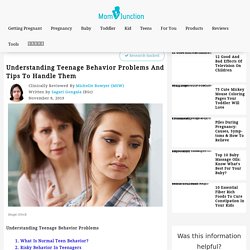
No matter how good a parent you are, and how great your relationship with your children is, you are likely to face parenting roadblocks when it comes to your teenager. Behavior problems are common in teenagers. But you can deal with them with ease if you are willing to put in the effort to understand what they are going through and what it is that they need from you. MomJunction gives you insight into teenage behavioral problems and how you can deal with them without straining the relationship with your child.
What adolescents (or teenagers) need to thrive. Guide to understanding teenagers. The Trouble with Teenagers. No one likes teenagers—not even their own parents.
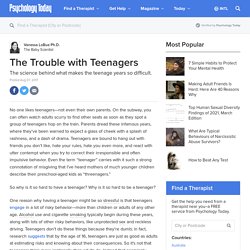
On the subway, you can often watch adults scurry to find other seats as soon as they spot a group of teenagers hop on the train. Parents dread these infamous years, where they’ve been warned to expect a glass of cheek with a splash of rashness, and a dash of drama. Teenagers are bound to hang out with friends you don’t like, hate your rules, hate you even more, and react with utter contempt when you try to correct their irresponsible and often impulsive behavior.
Operant Conditioning (B.F. Skinner) How Reinforcement and Punishment Modify Behavior Operant conditioning, also known as instrumental conditioning, is a method of learning normally attributed to B.F. Skinner, where the consequences of a response determine the probability of it being repeated. Operant Conditioning. What is Operant Conditioning? How We Learn. What Is Operant Conditioning and How Does It Work? Operant conditioning, sometimes referred to as instrumental conditioning, is a method of learning that employs rewards and punishments for behavior.
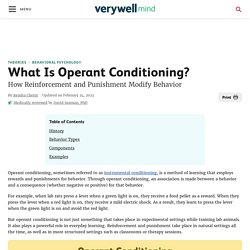
Through operant conditioning, an association is made between a behavior and a consequence (whether negative or positive) for that behavior.1 For example, when lab rats press a lever when a green light is on, they receive a food pellet as a reward. How to Reward Your Teen for Good Behavior. Teenagers are young adults who are trying to learn the ways of the world.
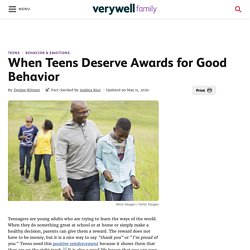
When they do something great at school or at home or simply make a healthy decision, parents can give them a reward. The reward does not have to be money, but it is a nice way to say "thank you" or "I'm proud of you. " Teens need this positive reinforcement because it shows them that they are on the right track.1 It is also a good life lesson that you can pass on: good things happen to good people. When Do Teenagers Deserve a Reward? A teen can earn a reward for positive behavior or by changing negative behavior.1 While you should not feel that you have to "pay" for every good thing your teen does, reinforcement of good behavior will help ensure that it continues.
Positive Reinforcement - Tips for teaching and parenting. Recognition for Positive Behavior as a Critical Youth Development Construct: Conceptual Bases and Implications on Youth Service Development. Recognition for positive behavior is an appropriate response of the social environment to elicit desirable external behavior among the youth.
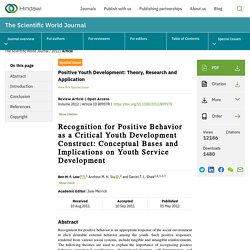
Such positive responses, rendered from various social systems, include tangible and intangible reinforcements. The following theories are used to explain the importance of recognizing positive behavior: operational conditioning, observational learning, self-determination, and humanistic perspective. In the current work, culturally and socially desirable behaviors are discussed in detail with reference to Chinese adolescents. Positive behavior recognition is especially important to adolescent development because it promotes identity formation as well as cultivates moral reasoning and social perspective thinking from various social systems.
Discipline strategies for teenagers. Teenage discipline: the basics Discipline isn’t about punishment.

It’s about teaching children appropriate ways to behave. Operant Conditioning - Parenting 101. The Study of Punishment in Psychology. Punishment is a term used in operant conditioning to refer to any change that occurs after a behavior that reduces the likelihood that that behavior will occur again in the future.

While positive and negative reinforcements are used to increase behaviors, punishment is focused on reducing or eliminating unwanted behaviors. Punishment is often mistakenly confused with negative reinforcement. The difference: Reinforcement increases the chances that a behavior will occur and punishment decreases the chances that a behavior will occur. Types of Punishment. Rewarding behavior is key to parenting teens, study suggests. Parenting is hard, and parenting teens brings about an entirely new set of challenges, from keeping their rooms clean to getting them home before curfew.

But, a new study suggests parents who want their teenagers to keep their grades up could have better success if they focus more on rewarding good behavior and less on threatening to punish the bad. According to the report, published in PLOS Computational Biology, British researchers have found that adolescents focus well on positive incentives, but have difficulty staying motivated to avoid penalties. The study shows that teens and adults learn in different ways, according to the study’s lead author Stefano Palminteri, a researcher with the Institute of Cognitive Neuroscience at University College London. It suggests that “in some cases positive feedback may have more of an effect than negative feedback on learning” in adolescents. “Rewards give them something they want to think about,” Allen said. 10 reminders of why parenting is rewarding. Parenting can feel unrewarding at times, but sometimes, all we need is a reminder as to why it isn't.

Just recently, I was rushing around getting my three kids ready for the school run. It was the first day back for my older girls and I was feeling really stressed. As I strapped my 3-year-old into the car, she said to me, "I love you. " The Responsibilities And Rewards Of Parenting. NOTE: this post was originally offered on my non-commercial blog (www.enjoyingtheride.net), which at the time of this posting is still up and running (but may not be in the future).

When I first became a mom, I had a few freak-out moments over the huge responsibility facing me as a new mom and the fact that my life had changed forever – virtually overnight. I remember clearly the fear I felt driving my new-born Zachary home from our first doctor’s appointment. In that moment, I realized what a responsibility I’d taken on and was a bit overwhelmed by it all.